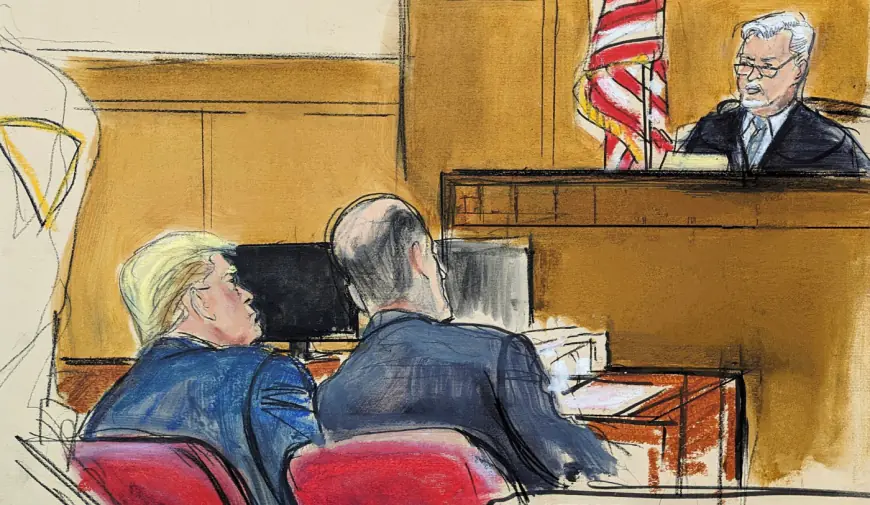Trump must still get jail time for his felonies
Yesterday, Acting Manhattan state Supreme Court Justice Juan Merchan postponed deadlines for the sentencing of former and future President Donald J. Trump for his convictions on 34 felony counts for fraudulently falsifying business records.

Yesterday, Acting Manhattan state Supreme Court Justice Juan Merchan postponed deadlines for the sentencing of former and future President Donald J. Trump for his convictions on 34 felony counts for fraudulently falsifying business records.
Both the district attorney and Trump’s defense lawyer, in response to Trump’s election victory, requested the delay to file their respective positions on the “appropriate steps going forward.”
Winning the presidential election, however, is not a proper mitigating factor for sentencing purposes and does not translate into a get-out-of-jail-free card.
In my more than 50 years of experience as a federal prosecutor and a criminal defense lawyer, I have taken part in hundreds of sentencing hearings. In my estimation, Trump deserves a term of imprisonment.
The two goals of sentencing are punishment and deterrence. The severity of Trump’s fraud cries out for punishment. Equally important is the clear message that a prison sentence would send — no one is above the law.
A prison sentence satisfies justice in this case based upon the trial evidence underlying the convictions. While Trump has no prior criminal convictions, the seriousness of the fraud calls for some measure of prison time. In its simplest terms, criminal fraud amounts to lying designed to steal something of value from the victim(s).
Here, the jury convicted Trump of lying to the entire American electorate with the intent to steal the election in 2016. While there was no monetary loss, there was a loss to American democracy resulting from the concealment from the voters of full and correct information highly material to their voting decisions particularly after the release of the “Access Hollywood” tape recording his bragging about grabbing women by the p****.
Public knowledge of Trump’s sex scandal and later hush money payment to Stormy Daniels may well have resulted in Trump losing his presidential bid in 2016 and in turn his viability to run for president in 2020 and 2024. This was not a petty victimless crime.
Moreover, the felony convictions signify that the jury had to conclude that Trump also intended to violate other criminal laws outlawing certain federal and state campaign contributions and New York State criminal tax laws.
An added factor for the court to consider are Trump’s extensive efforts to cover up his fraud. The evidence at trial showed that he attempted to prevent his attorney Michael Cohen from cooperating with the authorities. The evidence also revealed that Trump tried to cover up his fraud by creating false documentation to reimburse Cohen for the hush money payment to Daniels.
Significantly, there is also a serious issue of equal treatment under the law. The court cannot ignore Cohen having served time in prison for his involvement in this same fraud. Further, Merchan had imprisoned another major player in this fraud, Allen Weisselberg, the Trump Organization’s chief financial officer, to more than nine months in prison for crimes unrelated to this fraud.
Trump’s lawyers assert there should be no sentencing because Trump, as president cannot perform his duties from prison. But that does not mean Trump should not receive a jail sentence. Any prison sentence imposed on Trump can be suspended during his term as president.
After the sentencing, Trump’s lawyers can file a motion for a stay of the prison sentence in federal court arguing the constitutional framework mandates that Trump complete his presidential term prior to serving his sentence. The ability of Trump to perform as president is simply not a proper sentencing consideration for the state court.
Ironically, the stated reason Merchan granted Trump’s request to delay sentencing until after the election was because “[t]he public’s confidence in the integrity of our judicial system demands a sentencing hearing that is entirely focused on the verdict of the jury and the weighing of aggravating and mitigating factors free from distraction or distortion,” while respecting the jury’s verdict “in a manner that is not diluted by the enormity of the upcoming presidential election.”
If the concern is nullifying Trump’s criminal convictions as a gesture of goodwill for the country to start anew, that is a political decision outside the purview of the state court. That decision rests only with Gov. Hochul, who has the power to pardon Trump post-sentencing.
Our rule of law is on full display for the entire world to see. Anything less than a proper sentence of imprisonment will be an absolute travesty of justice and contrary to what would happen to any other individual convicted of 34 felony counts for perpetrating a similarly serious fraud.
Akerman was formerly an assistant special Watergate prosecutor and an assistant U.S. attorney for the Southern District of New York.
What's Your Reaction?









































































































